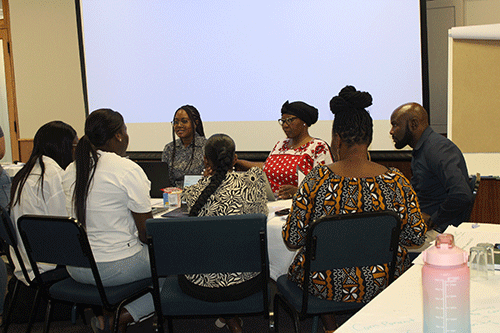josephina Mwashindange
TSUMEB – Stakeholders from various line ministries, local government and SOS villages in the Oshikoto and Oshana regions gathered in Tsumeb with the goal of developing and finalising strategies on the family strength. The three-day workshop took place on the 23-25 August 2023.
“We are in the process of child care reform on the global level, by making programme changes that meet the needs and rights of children,” said Eyob Berhanu Nezash, regional programme development advisor co-lead: Global Expert Group on Child Care Reform, from the International SOS Village in Addis Ababa-Ethiopia.
According to Nezash, countries such as Ghana and Rwanda are doing quite well when it comes to child care reforms, followed by Kenya, Tanzania, Zambia, Malawi and Namibia, although much still needs to be done from Namibia to further advance the child care reform.
He further stressed that, the magnitude of orphans in the Eastern and Southern Africa is high as a result of Covid-19 deaths as well as other factors such as economic crisis, war and conflict and the impact of climate change, adding that the character and capacity of families is also affected by growing urbanisation and poverty.
With the escalating number of children in the SOS centres, Nezash highlighted that the organisation is faced with challenges especially resources, in terms of land and support from the government to run foster care and kinship care.
“If the organisation can get support from the government to integrate the SOS families into the community in terms of housing, this will help us much better,” he said.
In the same vein, Iyaloo Ngodji, the national programmes director in Namibia, emphasised that despite the difficulties, the centres are working hard to provide all the kids need for their development, which is the centre’s primary goal. She said the centre has produced professionals including lawyers, psychologists, teachers and nurses. Due to the fact that the centre only accepts children under parental care, after turning 18, these young adults are reunited or reintegrated with their parents or guardians in order to return to the community and get self-reliance training.
In order to assist the children until such time as they are reunited with their families, the Ministry of Gender Equality, Poverty Eradication, and Social Welfare, according to Frieda Kadhepa, a chief social worker, will continue to support and develop their partnership with SOS. She however cautioned the community members to raise their own children instead of depending on childcare facilities.
SOS is a global institution with 26 sites throughout Eastern and Southern Africa with a history of almost 38 years. It has many programmes that focus more on children from the age of zero to 18 years old, especially on strengthening family bond and provision of alternative care services. Nevertheless, there is still opportunity for additional funding, either from local or worldwide sponsors, to mobilize funds for resources. The centres now receive support from companies in Norway, Germany, and Canada, to name a few.


